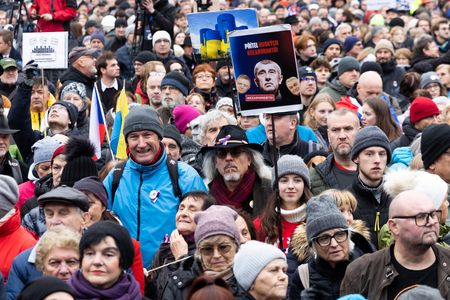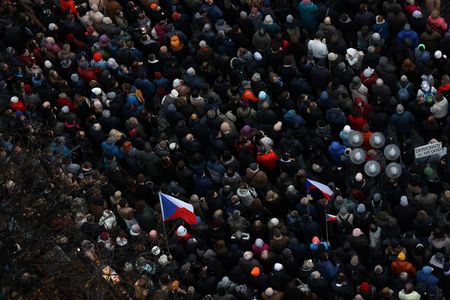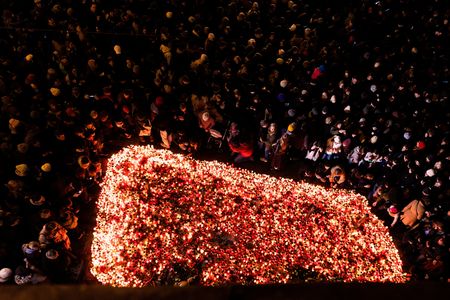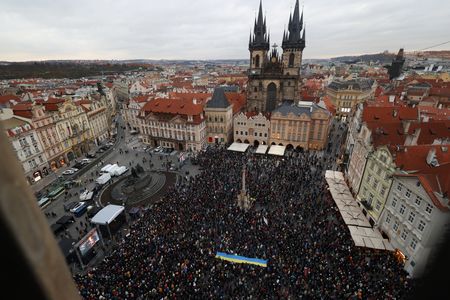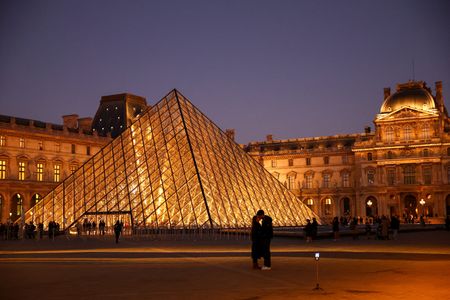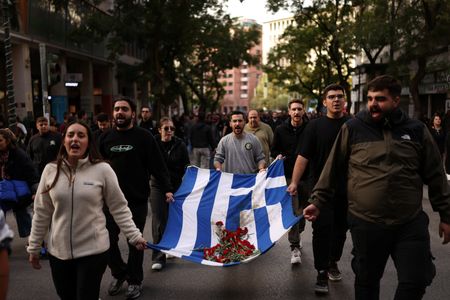PRAGUE/BRATISLAVA (Reuters) -Thousands of Czechs and Slovaks on Monday celebrated the anniversary of the 1989 Velvet Revolution, which ended decades of communist rule in the former Czechoslovakia, with protests that warned democratic values were once again under threat.
Czechoslovakia split peacefully in 1993 and the two nations have maintained friendly relations, both joining the European Union and NATO. But many fear the pro-Western, democratic outlook of both countries is under threat.
In Slovakia, many thousands gathered in the capital Bratislava and other cities at rallies organised by opposition parties and civic groups protesting what they see as democratic backsliding and pro-Russian policies of Prime Minister Robert Fico.
‘DRAGGING US AWAY FROM THE DEMOCRATIC WORLD’
Fico, who is serving his fourth term as prime minister, has taken pro-Russian stance on the Ukraine war and repeatedly travelled to meet Russian President Vladimir Putin. He has scrapped a special office to investigate corruption and serious crime, taken more state control over public media and accused public activists of planning a coup.
He has also said the EU could collapse and Slovakia needed to be prepared for such a scenario – sparking criticism he was introducing the possibility of leaving the EU into public debate, although he has not suggested the country should quit.
“Fico attacks independent institutions, culture, media … exactly like the communists did,” the leader of the opposition Democrats party, Jaroslav Nad, told the crowd. “Fico is dragging us away from the democratic world.”
Fico has argued that he is defending democratic values and national sovereignty and righting injustices done to him and allies by the previous government.
ANTI-EU, ANTI-NATO PARTY COULD JOIN NEXT CZECH GOVERNMENT
The Czech Republic’s October 3-4 election was won by the populist ANO party of billionaire businessman and former prime minister Andrej Babis, who has been trying to form a government with allies including an anti-EU and anti-NATO far-right party.
The Velvet Revolution is the most popular national political holiday in the Czech Republic and is marked by street concerts, exhibitions, and the lighting of candles on Prague’s Narodni avenue, where police beat up students at a peaceful rally in 1989.
This year, thousands also gathered at Prague’s Old Town Square, holding Czech, EU and Ukrainian flags to protest Babis, who critics say has conflicts of interests arising from his vast business holdings. Protesters also criticised proposals to cut aid for Ukraine and to take larger control over public media and the financing non-governmental organisations.
“The government that will probably be formed wants to loosen our ties with the civilized world, with Western Europe and with the European Union,” engineer Martin Leska said at the Prague rally.
“And I’m very concerned that it won’t be to the benefit of our country and the people who live in it.”
Babis has said he would deal with any conflicts of interest once appointed prime minister, but has not said how. This has sparked a conflict with President Petr Pavel, who has demanded that Babis make his intentions clear before he appoints him.
(Reporting by Eva Korinkova and Jan Lopatka in Prague and Radovan Stoklasa in Bratislava; Editing by Conor Humphries)




